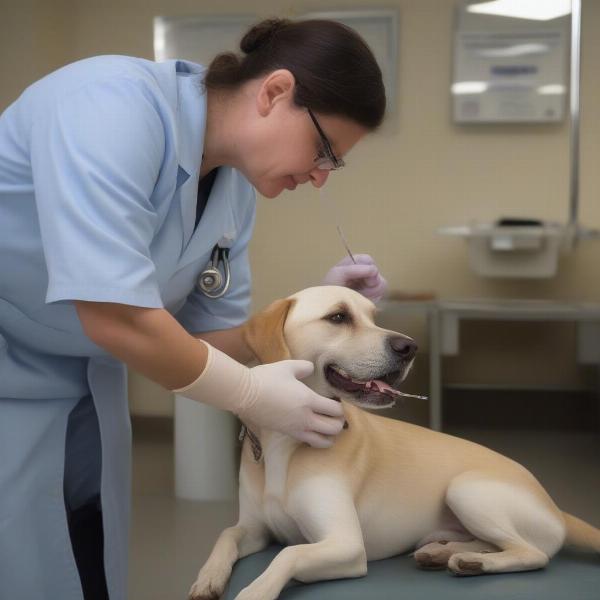If you’ve noticed your dog excessively itching, licking, or biting their paws after a romp in the park, a grass allergy could be the culprit. Understanding grass allergies in dogs, identifying the symptoms, and knowing how to manage them is essential for keeping your furry friend comfortable and healthy. This guide provides practical advice and solutions to help you navigate this common canine ailment.
Understanding Grass Allergies in Dogs
Just like humans, dogs can develop allergies to various environmental substances, including grass pollen. While we often associate allergies with spring, grass pollen can be present throughout the year, varying in concentration depending on climate and location. Your dog’s immune system mistakenly identifies these harmless pollen particles as a threat, triggering an allergic reaction. This reaction manifests in various ways, from mild skin irritation to more severe symptoms.
Identifying the Symptoms of Grass Allergy in Dogs
Recognizing the signs of a grass allergy is crucial for early intervention. Some common symptoms include:
- Excessive itching, licking, and chewing: Especially focused on the paws, ears, and belly.
- Red, inflamed skin: Often accompanied by small bumps or hives.
- Hair loss: Due to constant scratching and irritation.
- Sneezing and runny nose: Less common but can occur in some dogs.
- Ear infections: From excessive scratching and moisture buildup.
- Eye irritation: Redness, watery discharge, and pawing at the eyes.
If your dog exhibits any of these symptoms, it’s important to consult a veterinarian to rule out other conditions and confirm the diagnosis.
Managing Your Dog’s Grass Allergy
While a grass allergy can’t be completely cured, several strategies can help manage the symptoms and improve your dog’s quality of life.
Minimize Exposure to Grass
- Keep grass short: Regular mowing reduces pollen production.
- Wipe paws and coat: After walks, wipe your dog’s paws and coat with a damp towel or use pet wipes.
- Limit outdoor time: During peak pollen seasons, try to limit outdoor activities, especially in grassy areas.
- Consider alternative surfaces: Walk your dog on paved paths or consider indoor play areas.
Medications and Treatments
- Antihistamines: These can help reduce itching and inflammation. Your vet can recommend a suitable option for your dog.
- Corticosteroids: For more severe cases, these medications can provide relief but should be used judiciously due to potential side effects.
- Immunotherapy: This long-term treatment involves gradually exposing your dog to allergens to build up their tolerance.
- anti itch shampoo for dogs : Using a specialized shampoo can help soothe irritated skin.
Natural Remedies
- Oatmeal baths: Soothe irritated skin and provide relief from itching.
- Apple cider vinegar: Diluted apple cider vinegar can help balance skin pH and reduce inflammation. (Always consult with your vet before trying natural remedies.)
 Dog Receiving Allergy Injection from Vet
Dog Receiving Allergy Injection from Vet
Living with a Grass-Allergic Dog: Tips for Success
Managing a grass allergy requires ongoing effort and vigilance. Consistency is key to keeping your dog comfortable. Regular grooming, paw cleaning, and minimizing exposure are essential parts of the routine.
“Regular grooming can significantly improve a dog’s comfort during allergy season. It helps remove pollen and reduces skin irritation.” – Dr. Emily Carter, DVM
“Always consult your veterinarian before trying new treatments or remedies for your dog’s allergies.” – Dr. David Miller, DVM
Conclusion
Dealing with a grass allergy in your dog can be challenging, but with proper management and care, your furry companion can still enjoy a happy and comfortable life. By understanding the symptoms, minimizing exposure, and exploring available treatment options, you can help your dog thrive despite their allergy. Remember to consult with your veterinarian for personalized advice and guidance.
FAQ
- Can a dog outgrow a grass allergy? While rare, some dogs may experience a decrease in allergy symptoms over time.
- Are certain dog breeds more prone to grass allergies? Some breeds, like Terriers and Retrievers, seem to be more susceptible.
- Is there a test for grass allergies in dogs? Yes, your veterinarian can perform skin or blood tests to confirm the allergy.
- What if my dog ingests grass with pollen? Most dogs tolerate small amounts of grass ingestion, but large amounts can exacerbate allergy symptoms.
- Can a grass allergy be confused with other skin conditions? Yes, it’s important to consult a vet to rule out other conditions like flea allergies or infections.
- Are there any over-the-counter medications I can give my dog? While some are available, it’s best to consult your vet for appropriate dosage and potential interactions.
- Can diet affect grass allergy symptoms? A healthy diet supports overall immune function, which can indirectly affect allergy severity.
Related Articles
ILM Dog is your trusted resource for expert advice on dog breeds, health, training, nutrition, and grooming. We offer comprehensive information and resources to help you provide the best possible care for your canine companion. From puppy care to senior dog support, ILM Dog connects you with valuable insights and expert recommendations to enhance your dog’s well-being. Contact us today for personalized guidance: Email: [email protected], Phone: +44 20-3965-8624. Visit ILM Dog for more information.